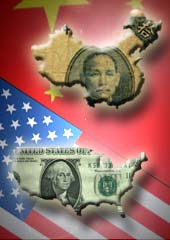Accountability as a Joint U.S.-Chinese Agenda
Can a better understanding between China and the United States bring about a new model of cooperation?
December 11, 2007

America’s negative rhetoric towards China is getting in the way of the much-preferred alternative — the combined problem-solving power of the United States and China. At its extreme, this decidedly negative stance — whether threats to boycott Chinese products or the Beijing Olympics — undermines the two countries’ potential ability to co-manage global economic and ecological challenges.
While the United States and China cannot go back in time to align their mutual cultural awareness with the same intensity as they have their economic integration, the two cultures can build a common understanding and language around the notion of accountability. Surprising though it may appear at first glance, this is precisely the area where Chinese and American values are now converging. Consequently, common understanding of accountability will help the United States move away from negative rhetoric and make genuine collaboration possible. Truth be told, there are significant examples of China’s movement towards the traditional U.S. style of accountability.
One such example is the recent petition and protest by Shanghai residents to stop the government’s expansion of the Maglev rail out of concern for the environment, and opposition to waste and corruption. Another vital example is the anger over the many lives lost in Chinese coal mines. There seems to be a growing consensus that development purely for development’s sake can be wasteful. This sentiment, echoed in protests against the elimination of traditional architecture to make way for modern high-rises, raises domestic expectations for corporate accountability in general.
These efforts to establish domestic accountability are not dissimilar to situations faced in the United States. Even if the legal, regulatory and punitive responses applied by China don’t mirror those of the United States — and while some run counter to U.S. values — there is nevertheless a growing culture of accountability that Americans can relate to and mutually reinforce. Indeed, as this year’s Chinese toy import scare demonstrated, the standards of Chinese producers are already tied to the human concerns of U.S. consumers, a relationship that requires — and is garnering — U.S.-style accountability.
The growing tendency in China to address crises in confidence about business as usual — whether regarding exports or Beijing’s air quality — may have been triggered by the international relationships, status and pride China has acquired on the economic world stage. More importantly, though, it is reinforced by China’s growing middle class.
Whereas in the past, Chinese individuals were primarily accountable to the family and the community, the internationalization of China has helped introduce the notion of accountability of governments and corporations to the individual. With the middle class currently estimated to be 12-19% of the workforce, once China reaches some kind of “accountability tipping point,” consumers will become stronger brokers of domestic policy — and eventually of China’s international role. While Americans may feel China’s top-down approach to local democracy is inherently contradictory, they should nevertheless offer positive support for reform — including in establishing property rights — rather than discounting China’s actions entirely. Each of these changes brings understanding of their respective systems closer together.
Even when Chinese officials and companies communicate their sense of accountability — however imperfectly by U.S. standards — the United States should nevertheless welcome that step. After all, it reflects a growing sense of responsibility and concern for safety. Chinese officials’ efforts to build trust can create a more virtuous cycle that can impact broader U.S.-China relations and the countries’ joint global responsibilities.
Traditionally, Americans have not been satisfied with China’s response to U.S. concerns — and labeled a lack of “direct answers” as evasive. An important part of the problem is that Americans have generally been at a loss when facing non-prostelyzing cultures such as China because Americans prefer their own style of contrition and “direct marketing” of core values. For example, China’s efforts to appreciate the yuan should be reaffirmed, not completely dismissed — because the U.S.-China trade imbalance still exists. The appreciation process took two to three years, in part because of concerns over stability — something Americans tend to take for granted.
U.S. affirmation in this regard could help de-escalate trade and currency battles, creating an enabling environment for addressing other issues. Furthermore, China’s efforts in international accountability also set the bar higher in its growing domestic market, for example in food quality. The more the government provides information on health and safety issues to the media, the stronger the enabling environment for corporate accountability. As a result, there is growing confidence that Chinese markets will in fact adjust themselves.
If Chinese and U.S. companies demonstrate best practices together, they would then be in a position to lead the charge for accountability. Such a step, though, requires more humility from Americans — in recognizing that the United States has to meet its own challenges in corporate governance. In short, the United States’ and China’s ability to apply their combined problem-solving power within the context of positive and reinforcing relations requires leadership and partnerships between many communities in their respective countries.
The voice of politicians and the role of middle classes is not enough. The United States and China also need to solicit and promote the cultural, business, finance, philanthropic, non-profit, consumer, labor and academic perspectives. In addition, they will need to focus on efforts to make progress on their parallel predicaments in carbon output, economic inequality and maintaining trade.
If the effort to meet rising expectations were to result in each side acting responsibly, that would help stabilize what otherwise can be a fragile — if not potentially explosive — chain of global investments. Co-management does not imply that the United States renounces its values: Co-management can increase existing U.S. influence at the intersection of human rights and politics in places like Darfur and Burma. Many states look to China’s — not just the United States’ — economy as models of success. This spotlight gives both nations even more impetus and credibility to clear the air in Beijing and Los Angeles (as well as between their two countries).
The agenda is indeed large: Revamp energy, transport and health sectors, and discuss trade and currency issues as they would with a long-term co-manager. If the collective American mind maintains that peaceful coexistence in the “superpower space” is impossible, U.S.-China collaboration can never be built on trust and good intentions. However, if the United States focuses less on threats, retaliation and concessions and more on problem-solving, this constructive view can see real results.
Read previous

Dateline Bali: Curbing CO2 Emissions
December 7, 2007
